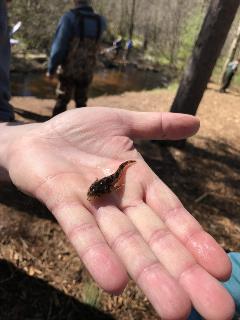Samantha Briggs, IWLA Clean Water Program Director
Outdoor America 2020 Issue 2
When you think about successful water monitoring outcomes, what comes to mind? Identifying and stopping the actions of a big industrial polluter? Finding a pipeline spewing oil and having it repaired? Holding agencies accountable for properly regulating pollution?
These types of victories are great wins for volunteer water quality monitoring. Fortunately, and unfortunately, big wins like these are becoming exceedingly rare. “Fortunately,” because the Clean Water Act has been an incredibly effective tool for reducing pollution from a pipe – the untreated, unregulated industrial pollution that spurred passage of the law. “Unfortunately,” because the primary threat today is runoff from tens of millions of acres of farms, suburban lawns and cities across America. Success today – and in the future – will be defined by detecting and tackling this 21st century threat.
 Sometimes when looking for macroinvertebrates you find other critters in your net like this sculpin!
Sometimes when looking for macroinvertebrates you find other critters in your net like this sculpin!
It is time to redefine what success is for our volunteer monitoring program, Save Our Streams (SOS). Success is not simply putting an end to drastic pollution events (such as the Central New York Chapter monitoring to pinpoint polluted runoff from Hancock Airport in the 1990s). Success is also monitoring more stream sites. If most streams in America are not regularly monitored, there is no way to detect these drastic pollution events. In other words, you don’t know what you don’t know. Although the COVID-19 pandemic has forced many of us to step away from our normal biological monitoring in groups, there are still ways each of us can help SOS succeed by monitoring more sites. For example, chemical monitoring is an excellent opportunity to capture important water quality data while social distancing since it can be done quickly and individually.
Another measure of success for our program is how well we educate the public about water quality in local communities. SOS volunteers, such as Mike Fuge with the Bill Cook Chapter in Wisconsin, help school groups learn to monitor and give those students an exceptional learning experience while gathering valid data. Jim Sweeney from the Spring Lake Chapter in Indiana participates in a Canoemobile event every year, showing students the magic of macroinvertebrates.
 Students learn how to monitor for dissolved oxygen with seasoned SOS volunteer, Mike Fuge.
Students learn how to monitor for dissolved oxygen with seasoned SOS volunteer, Mike Fuge.
SOS education successes also go further and help people make connections between what we do on our land and how it affects water quality. Our Salt Watch program is building those connections for communities all over the country that must deal with ice and snow. People who have never made the connection between road salt and degraded water quality (and drinking water!) are now making changes because they see the connection. No drastic, pipeline-sized problems are being solved overnight. However, community advocacy is on the rise, students and the public are learning about the impacts of road salt, and people are going to sleep at night knowing more about what they can do to help their water quality than when they woke up. That is certainly a victory.
Our Clean Water Hub database is also raising public awareness and making our monitors’ data available to anyone who wants to know more about their local streams. Monitors submitting their data to the Hub and helping people understand their local water quality is a victory.
Whether you are monitoring or not, engaging your communities in water quality issues (from nutrients to road salt, aquatic life to drinking water) is something we all can participate in and celebrate.
Fostering a more engaged community that is concerned about water quality is a success story – a true victory – that we should start talking more about.
Tell us your success stories, share them on social media, and talk to your communities (even virtually) so we can expand our reach beyond the excellent volunteers we already have.
Please send your stories and victories to sos@iwla.org so that we can learn more about what you all are achieving on the ground and how we can help you and others create a more informed network of clean water advocates in your community.
Get involved with Save Our Streams